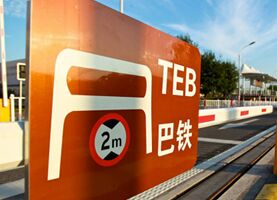中国股市高频交易退潮
|
A “traffic-straddling” Chinese bus project that was touted as a solution to road congestion has been scrapped amid allegations of illegal fundraising, with authorities claiming it was used as a lure to sell financial products. The futuristic bus, known as the “batie”, became an internet sensation last year after it was marketed as a solution to China’s notoriously clogged roads. However, many people doubted the practicality of an elevated bus that allows lanes of cars to flow underneath it, but was too low for trucks to fit.
The project hit a further speedbump when Chinese media alleged that Bai Zhiming — chief executive of the Transit Elevated Bus company — was using the technology as a vehicle to lure investors into buying financial products sold on funding platforms. On Sunday Chinese authorities said they had launched a probe into the company for alleged illegal fundraising through Huaying Kailai, an online financing platform founded by Mr Bai. Huaying Kailai had raised Rmb130m ($19m) as of the end of 2016 at a 12 per cent annual interest rate for the development of the bus, Chinese media reported last year. Mr Bai was among 32 people detained over the past week, according to police in Beijing. Mr Bai could not be reached for comment and the project’s former chief engineer did not respond to messages. The axing of the elevated bus project comes as Chinese authorities look to crack down on the use of shadow banking products to fund overseas acquisitions. Last month, the head of insurer Anbang was detained as regulators warned against the systemic risks posed by high-interest fundraising. The collapse of high-interest Chinese fundraising schemes in 2015, including the Ezubao peer-to-peer lending scheme and the Fanya metals fundraising scheme, prompted investor protests in the streets. The elevated bus prototype — an electric vehicle 22m long, 7.8m wide and 4.8m high that could hold 300 passengers — appeared to enjoy some official support. It was supposed to be tested in Beidaihe, the seaside resort where China’s top political leaders and retired Communist party elders retreat each summer. The government of Qinhuangdao city, which includes Beidaihe, signed a memorandum of understanding for the company to invest Rmb10bn ($1.5bn) in the project. Mr Bai purchased the “batie” trademark from its inventor with the intention of entering public-private partnerships (PPP) with local governments, he told the FT last year. But his main business appeared to be online fundraising platforms. Another of his organisations, an association founded to facilitate PPP projects, was included in a Ministry of Civil Affairs list of “fake social organisations”. The first sign of official action against the project came last month, when pilot tracks in Beidaihe were ripped up. |









